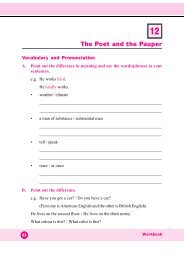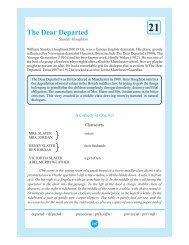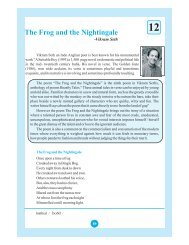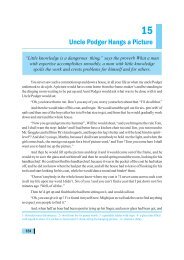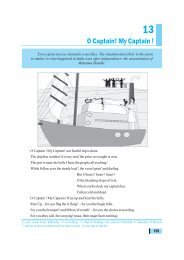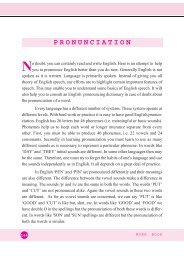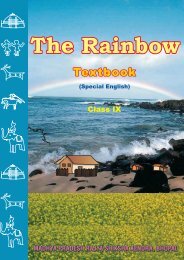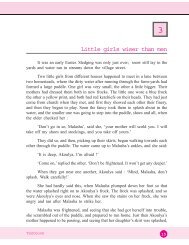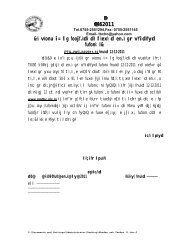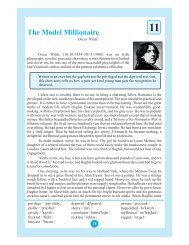William Shakespeare
William Shakespeare
William Shakespeare
Create successful ePaper yourself
Turn your PDF publications into a flip-book with our unique Google optimized e-Paper software.
Mercy<br />
-<strong>William</strong> <strong>Shakespeare</strong><br />
<strong>William</strong> <strong>Shakespeare</strong> (1564-1616) is unquestionably the greatest poetic<br />
dramatist of Europe. As a product of the European Renaissance, he brought<br />
the classical humanistic tradition to bear on his works. His works include 37<br />
major plays, 154 sonnets and other poems. It is a tribute to his genius that he<br />
continues to be acclaimed universally for his knowledge of the human heart<br />
and understanding of human psychology.<br />
This poem, entitled Mercy, is an extract from Act IV, Scene I of The Merchant of<br />
Venice, a famous <strong>Shakespeare</strong>an comedy. In these lines, Portia, the protagonist of<br />
the play pleads with Shylock the value of mercy. As a human virtue, mercy not only<br />
transcends the worldly power, but also becomes divine grace when combined with<br />
justice. It glorifies the giver and the taker alike.<br />
Rendered in blank verse, this poem is a striking example of the Renaissance ethos. It<br />
puts up a cogent plea for liberal human values.<br />
The quality of mercy is not strained;<br />
It droppeth as the gentle rain from heaven<br />
Upon the place beneath. It is twice blest-<br />
It blesseth him that gives, and him that takes.<br />
'Tis mightiest in the mightiest. It becomes<br />
The throned monarch better than his crown.<br />
His scepter shows the force of temporal power,<br />
The attribute to awe and majesty,<br />
Wherein doth sit the dread and fear of Kings;<br />
But mercy is above this sceptred sway;<br />
It is enthroned in the hearts of Kings,<br />
It is an attribute to God himself.<br />
And earthly power then show likest God's<br />
When mercy seasons justice…<br />
Renaissance / rI'neIsns /<br />
protagonist / prJ't&gJnIst /<br />
45<br />
cogent / 'kJUdZJnt /<br />
transcends / tr&n'sends /<br />
7
Glossary<br />
Renaissance - rebirth; the period in European civilization following the MiddleAges<br />
th th<br />
(14 -16 century AD), marked by a surge of interest in classical<br />
strained -<br />
tradition of belief, aimed at human happiness learning and humanistic<br />
values<br />
forced<br />
droppeth - drops<br />
blesseth - blesses<br />
throned - occupying the ruling seat<br />
scepter - an ornamental staff held as an emblem of authority<br />
temporal - worldly<br />
blest - blessed<br />
attribute - quality<br />
awe - fear<br />
doth - does<br />
majesty - supreme authority<br />
sway - power<br />
likest - like<br />
enthroned - invested with sovereign power or authority<br />
seasons - tempers<br />
Word Power<br />
Exercises<br />
(A) Choose the words from the text, which are opposite in meaning to the words given<br />
here:<br />
cruelty, above, spiritual, injustice, courage, hell, curse<br />
(B) Mark the use of the word, enthroned.<br />
It is a verb-form, derived from the noun,<br />
throne,<br />
using the prefix, en- . Make a list of prefixes/suffixes and give verb forms of<br />
the following nouns:<br />
power, place, heart, justice, force, quality<br />
th<br />
(C) In the 7 line, show has been used as a verb. It can also be used as a noun:<br />
The show passed off peacefully.<br />
Make sentences using the following words as noun and verb:<br />
season, attribute, sway, force, drop, crown<br />
(D) Mark the use of the word, the mightiest.<br />
It is an adjective in the superlative degree.<br />
The other two forms in the positive and comparative degrees are: mighty, mightier.<br />
Give the forms of the following adjectives in the comparative and superlative<br />
46
(E)<br />
degrees.<br />
gentle, good, unlikely, quick, light, bad, far<br />
Match the words in column A with those in column B.<br />
Column A Column B<br />
Renaissance worldly<br />
temporal supreme authority<br />
majesty quality<br />
attribute power<br />
sway fear<br />
awe rebirth<br />
(F) Match words with their meanings, and use them in sentences of your own to bring<br />
out the difference in their meanings.<br />
mercy the feeling of being sorry for somebody<br />
compassion used to show that you are disappointed about something<br />
pity the ability to understand another person's feelings<br />
sympathy a kind or forgiving attitude towards somebody<br />
empathy the aim of giving money, food, help, etc.<br />
charity<br />
For example,<br />
a strong feeling of sympathy for people<br />
(i) Mercy (a kind or forgiving attitude towards somebody): The criminal pleaded for<br />
mercy from the judge.<br />
Comprehension<br />
(A) (i) 'But mercy is above this sceptred sway'. Explain.<br />
(ii) Why does the poet believe that 'earthly power then show likest God's when<br />
mercy seasons justice…'?<br />
(iii) His scepter shows the force of temporal power,<br />
The attribute to awe and majesty,<br />
(a) What is an attribute to awe and majesty?<br />
(b) What does show the force of temporal power?<br />
(iv) It droppeth as the gentle rain from heaven<br />
Upon the place beneath. It is twice blest-<br />
It blesseth him that gives, and him that takes.<br />
(a) What is mercy compared above lines?<br />
(b) How is mercy twice-blessed?<br />
(B) Write answer to the following question in two or three sentences each:<br />
(i) What is the quality of mercy?<br />
(ii) What makes mercy twice-blessed?<br />
47
(iii) What does qualify a monarch more-mercy or throne? Why?<br />
(iv) What does the scepter show?<br />
(v) What is an attribute of God himself?<br />
(vi) What happens when mercy is tempered with justice?<br />
(C) Write answer to the following question in about 150 words.<br />
(i) How does mercy bless the giver and the taker alike?<br />
(ii) Give the central idea of the poem.<br />
Poetic Devices<br />
Notice the comparison of mercy with rain. It is a poetic device, called simile. A<br />
simile is a comparison of two unlike things, using 'like' or 'as'. Another important<br />
device is metaphor.<br />
The comparison is hidden in metaphor whereas it is obvious<br />
in simile.<br />
For example,<br />
(a) (i) The colonel roars like a lion. (simile)<br />
(ii) The colonel is a lion. (metaphor)<br />
(b) (i) He is cunning as a fox. (simile)<br />
(ii) He is a fox. (metaphor)<br />
(c) (i) My friend is slow as a snail. (simile)<br />
(ii) My friend is a snail. (metaphor)<br />
(A) Frame three such pairs of sentences, showing the difference between simile and<br />
metaphor.<br />
th<br />
(B) Notice the repetition of the same sound in the 10 line, 'sceptred sway'. This is an<br />
example of alliteration.Alliteration is a figure of speech, in which the same sound or<br />
letter is repeated at the beginning of words that are close together.<br />
For example,<br />
Three thousands<br />
did I see at a glance! (sound't')<br />
Every time she slide or sprang.<br />
(sound 's')<br />
(C) Observe the syllable, foot, metre and rhyme-scheme of each line.<br />
Syllable-It<br />
is the shortest segment of speech with a vowel. The consonant sounds<br />
may occur either before or after the vowel.<br />
For example, I, Out, Too, The, Qua-li-ty<br />
Foot-It<br />
is the smallest unit of metrical composition. It consists of syllables (short<br />
and/or long / ) and make up the metre of a poetic line. For example,<br />
- / - / - / - / - /<br />
The qua-li-ty /of mer/-cy is/ not strained<br />
48
The above line has five feet of two syllables each, the short followed by the long.<br />
This kind of foot is called Iambic.<br />
Metre-<br />
Metre consists of feet (or beats in music), adding rhythm to a poetic line. For<br />
example, the above line has five feet in iambus .Therefore, it is in iambic pentameter,<br />
very popular with the poets.<br />
Rhyme-scheme- It is an arrangement of rhyme from the last syllable of each line,<br />
denoted by letters in lowercase(abcd…).When a rhyme is repeated, the pattern<br />
becomes distinct.<br />
This 14-line poem is unrhymed verse in iambic pentameter, which is commonly<br />
called<br />
blank verse.<br />
<strong>Shakespeare</strong> has used this poetic form skillfully in his dramas<br />
because it is closest to the natural rhythms of English speech, and can be adapted<br />
to various levels of discourse.<br />
Speaking Activity<br />
(A) Read aloud parts of the poem in groups, observing the stress-pattern.<br />
(Consult an English Pronunciation Dictionary)<br />
(B) Under the Indian law, the President of India can show mercy and commute the death<br />
sentence to life imprisonment. Do you think this provision should be continued? Give<br />
your arguments (for, or against).<br />
Writing Skills<br />
(A) Develop a story on the moral of mercy with the help of the following outlines: there<br />
lived a saint-visitor to the river- a scorpion bit him-he was asked to kill it-the saint<br />
refused-wisdom prevailed……<br />
(B) Write a letter to your friend, narrating one such event when your act of mercy was<br />
highly appreciated.<br />
Think it over<br />
(A) Mercy ennobles mankind. Think of other values which contribute to the development<br />
of human personality.<br />
(B) Every religion insists on showing mercy to fellow creatures. Think of the other noble<br />
values fostered by religions.<br />
Things to do<br />
(A) Prepare a list of <strong>William</strong> <strong>Shakespeare</strong>'s comedies.<br />
(B) Have you read any other 14-line poem in a rhyme-scheme? It is known as sonnet.<br />
<strong>Shakespeare</strong> has written 154 sonnets in all, based on his own life. Read some of the<br />
49
sonnets and examine their rhyme-scheme.<br />
(C) Read the following extract from <strong>Shakespeare</strong>'s play, Hamlet and underline the lines<br />
that are well-known and oft-quoted.<br />
Give thy thoughts no tongue,<br />
Nor any unproportion'd thought his act:<br />
Be thou familiar; but by no means vulgar:<br />
The friends thou hast, and their adoption tried,<br />
Grapple them to thy soul, with hoops of steel:<br />
But do not dull my palm, with entertainment<br />
Of each unhatch'd, unfledg'd, comrade. Beware<br />
Of entrance to a quarrel; but being in<br />
Bear't that th' opposed may beware of thee.<br />
Give every man thine ear; but few thy voice:<br />
Take each man's censure: but reserve thy judgment:<br />
Costly thy habit as thy purse can buy;<br />
But not express'd in fancy; rich, not gaudy;<br />
For the apparel oft proclaims the man<br />
And they in France of the best rank and station<br />
Are most select and generous chief in that,<br />
Neither a borrower nor a lender be;<br />
For loan oft loses both itself and friend:<br />
And borrowing dulls the edge of husbandry.<br />
This above all; to thine ownself be true:<br />
And it must follow, as the night the day,<br />
Thou canst not then be false to any man.<br />
(D)<br />
Look for such poetic lines in <strong>Shakespeare</strong>'s other plays, which have become part of the<br />
common memory.<br />
What do you understand by these lines explain in two to three sentences.<br />
(a) Give every man thine ear; but few they voice<br />
(b) Costly thy habit as thy purse can buy<br />
(c) Apparel off proclaims the man<br />
(d) neither<br />
a borrower nor a lender be<br />
50



